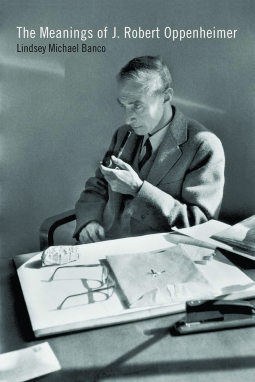
The Meanings of J. Robert Oppenheimer
by Lindsey Michael Banco
This title was previously available on NetGalley and is now archived.
Send NetGalley books directly to your Kindle or Kindle app
1
To read on a Kindle or Kindle app, please add kindle@netgalley.com as an approved email address to receive files in your Amazon account. Click here for step-by-step instructions.
2
Also find your Kindle email address within your Amazon account, and enter it here.
Pub Date May 15 2016 | Archive Date May 13 2016
University of Iowa Press | The New American Canon
Description
The Meanings of J. Robert Oppenheimer examines how he has been represented over the past seven decades in biographies, histories, fiction, comics, photographs, film, television, documentaries, theater, and museums. Lindsey Michael Banco gathers an unprecedented group of cultural texts and seeks to understand the multiple meanings Oppenheimer has held in American popular culture since 1945. He traces the ways these representations of Oppenheimer have influenced public understanding of the atomic bomb, technology, physics, the figure of the scientist, the role of science in war, and even what it means to pursue knowledge of the world around us. Questioning and unpacking both how and why Oppenheimer is depicted as he is across time and genre, this book is broad in scope, profound in detail, and offers unique insights into the rise of nuclear culture and how we think about the relationship between history, imagination, science, and nuclear weapons today.
Advance Praise
“Robert Oppenheimer is endlessly fascinating. His life engaged the most profound issues of our time: the revolution in physics, the Great Depression, the Popular Front, the development of nuclear weapons, and the corrosive influence of the anti-Communist hysteria of the 1950s. Lindsey Banco expands our understanding of his influence by investigating his ‘meaning’ to our political culture. It is another important contribution to the Oppenheimer Library.”—Martin J. Sherwin, coauthor, American Prometheus: The Triumph and Tragedy of J. Robert Oppenheimer, winner of the 2006 Pulitzer Prize for Biography
“The Meanings of J. Robert Oppenheimer is an intriguing book about an important issue and an equally important person. It complements and builds on existing scholarship on Oppenheimer and the atomic bomb, and is well worth reading for anyone with an interest in Cold War America, the Manhattan Project, and the enigmatic figure that is Oppenheimer.”—Allan M. Winkler, Miami University of Ohio
“Oppenheimer has always been the ghostly presence behind nuclear culture in the United States, and Banco has done him a great service by thinking about him in all his ambivalent and paradoxical brilliance. Far afield from conventional biographies, The Meanings of J. Robert Oppenheimer explores the man and the idea of the man as a series of dualities, showing how a retiring physicist who went to the desert wound up setting the terms for so many aspects of postwar culture. A unique contribution to Cold War studies.”—Steven Belletto, author, No Accident, Comrade: Chance and Design in Cold War American Narratives
Available Editions
| EDITION | Paperback |
| ISBN | 9781609384197 |
| PRICE | $22.50 (USD) |
Links
Average rating from 5 members
Featured Reviews
This is not a bio, it is a vital work that encompasses the works of Dr. Oppenheimer as well as all that has been written about him over the years. It is concise and wide ranging in its scope of information. I highly recommend if you are just a layperson or a student of history this is a excellent guide to this important figure in history.
Readers who liked this book also liked:
Marie Bostwick
Historical Fiction, Literary Fiction, Women's Fiction
Terah Shelton Harris
General Fiction (Adult), Multicultural Interest, Women's Fiction
Jennie Garth
Biographies & Memoirs, Parenting, Families, Relationships, Religion & Spirituality
Kate Quinn
General Fiction (Adult), Sci Fi & Fantasy, Women's Fiction


















